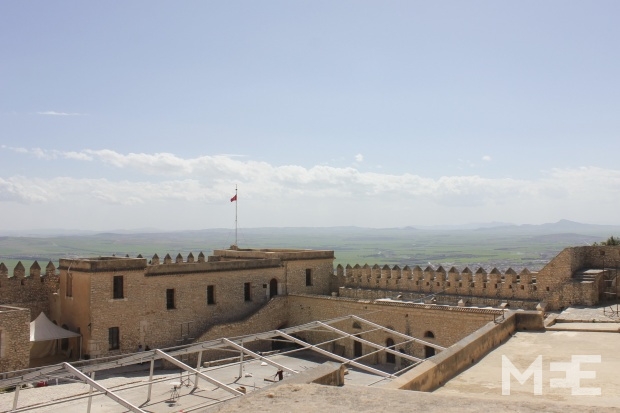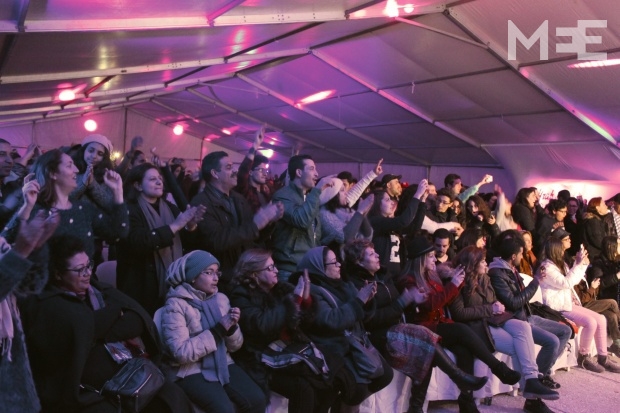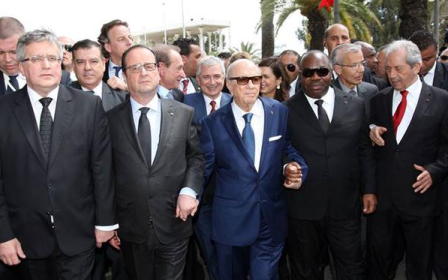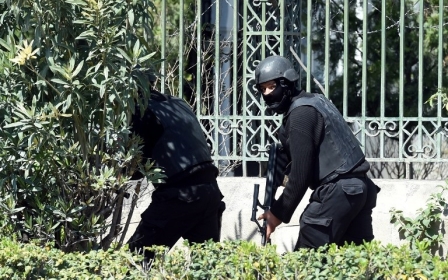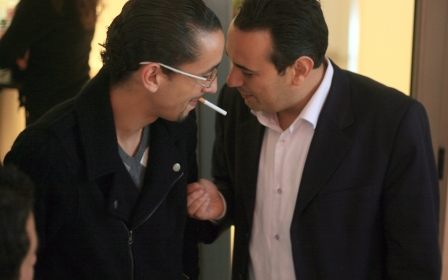In Tunisia’s El Kef, it's about resilience, and all that jazz
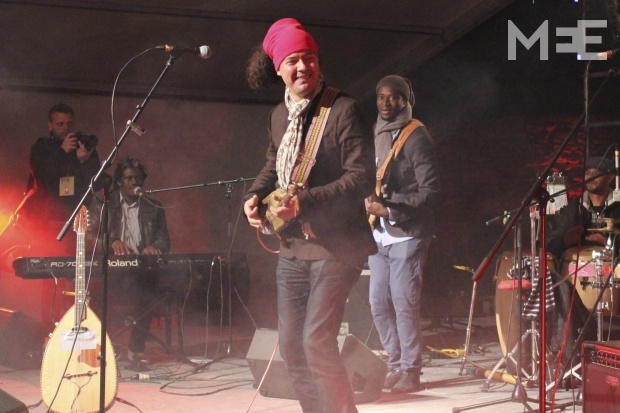
EL KEF, Tunisia - Part of the way through his set on the last night of the Sicca Jazz Festival in the Tunisian town of El Kef, David Murray, a saxophone player from the US, took his instrument from his lips and approached the microphone. “We dedicate this song to all the people who lost their lives,” he said, referring to the 20 tourists and one Tunisian who were killed in the 18 March attack on the Bardo National Museum in Tunisia’s capital.
Murray’s Infinity Quartet went on to play a quick tempo number that mixed mourning and jubilation in the tradition of a New Orleans street funeral, as much a celebration of life as lamentation of death. The audience of around 500, crowded under a tent erected inside El Kef’s historic Kasbah, swayed with the rhythm in their seats and on their feet. The song matched the tone of remembrance and resilience that the festival’s organisers and musicians hoped to set by pushing through with their show in the wake of the recent national tragedy.
The Sicca Jazz Festival, which took place from 20 to 22 March, was organised for the first time this year as an attempt to attract both internal and international tourism to El Kef. The town, located 175 km (109 miles) from Tunis and 40 km (25 miles) from the Algerian border, has a rich, multi-layered history with well-intact sights spanning human pre-history through the Ottoman Empire. It also has a reputation for churning out some of Tunisia’s best artists, actors and actresses and musicians.
El Kef’s proximity to the Algerian border, however, where militant groups have been waging a low-level campaign against Tunisian security forces since 2011, has cast an aura of insecurity over the whole northwestern region of Tunisia. The city’s association with this area, in addition to a modern history of economic marginalisation, has made it difficult to attract visitors.
The attack on the Bardo Museum, which many are viewing as an assault on the country’s tourism industry, will likely only make the situation more difficult. If the Sicca Jazz Festival is any indication, however, organisers in El Kef and musicians seem prepared to face these challenges and audiences appear willing to still show up.
The festival
The Sicca Jazz festival is the brainchild of Ramzi Jbabli, a lawyer living in Tunis who grew up in a village close to El Kef. Jbabli has long been a supporter of and participant in Tunisia’s cultural life and wanted to do something to highlight cultural activity in El Kef. He also wanted to help attract Tunisian and foreign tourists to visit the city to help stimulate the local economy. The name of the festival is derived from the Roman name for El Kef.
After Jbabli came up with the idea in January, he recruited an organising team of youth from the town who put the festival together in just two months. Many of the people on the organising team are from El Kef, but have left to study and work elsewhere in Tunisia. Still, they harbour a special affection for their city and wanted to do something to give back. “You don’t really know how much we love this small town,” Soumaya Ghars, 24, a member of the organising team, told Middle East Eye.
“We wanted to do something to put El Kef in the place it deserves,” added Khaoula Trad, 26, also on the organising team.
El Kef
El Kef is a small town of narrow streets that wind up the side of a steep hill towards a citadel, or Kasbah, built of sand-coloured stones, which sits at the top of the city. The current structure of the Kasbah dates from the Roman era (second century BCE to fifth century CE) and was later renovated by the Ottomans (1574-1881) when they took control of the area.
The historical sights in El Kef span a wide range of empires and epochs. During the course of a brief walk inside the city, visitors can see a Roman bathhouse, graveyard and cisterns, an ancient synagogue, an early Christian church and an 18th-century shrine to the Muslim Sufi saint Bou Makhlouf, in addition to the Kasbah. The sights are woven in to the urban fabric of the city and residents like to point them out as a testament to El Kef’s history of multiculturalism and tolerance.
Just outside of the city, there is a cemetery with sections for Muslims, Christians and Jews, the later two communities having lived in El Kef until the mid-20th century. A half an hour hike from the cemetery, there is a rock formation pocketed with caves that was used as a settlement by pre-historic humans.
During World War II, El Kef served as the provisional capital of Tunisia, but since then it has suffered from the regional neglect that has left much of the country’s interior underdeveloped in comparison to the privileged coast. Today, approximately 45,000 people live in the city, which residents describe as predominantly poor with a limited middle class.
At the same time, El Kef is considered one of the cultural centres of Tunisia, with a disproportionate number of artists, musicians and actors and actresses coming from the town. “I think El Kef is full of culture,” Alia Sellami, a jazz vocalist from Tunis who performed at the festival, told MEE. “It is the city of arts in Tunisia.”
The value of El Kef’s historical and cultural legacy is not lost on the local population. “Speaking about El Kef we are speaking about history, we are speaking about culture. We have everything here,” Trad said.
Fear of insecurity
Despite its rich history and culture and in addition to its modern history of marginalisation, security concerns due to El Kef’s proximity to the Algerian border have hampered the town’s ability to attract visitors. Since 2011, several small militant groups have taken advantage of Tunisia’s transition period and an absence of state power in southern Algeria to establish a presence in the Chaambi mountain region along the border between the two countries.
Militant attacks, almost exclusively targeting Tunisian security forces in the region, have resulted in dozens of deaths and an ongoing campaign to dislodge militants from the mountain.
As a result of the attacks, the northwestern area of Tunisia close to the border with Algeria, including El Kef, is considered a “red zone” by Tunisian security forces, and Western embassies caution their citizens against travelling to the region.
On the last night of the festival, in fact, a landmine attack 20 km (12 miles) from El Kef killed one security officer and injured three others, a solemn reminder of the reality of the security concerns in the area.
In the wake of the attack on the National Museum in Bardo, many analysts and Tunisians are expecting Tunisia’s tourism industry to suffer. Residents of El Kef anticipate that this will affect their city as well. “What happened will make tourism difficult in every town, not just El Kef,” Ghars said.
Message of resilience
Despite the exacerbation of security concerns following the Bardo attack, only one performer out of six playing the festival cancelled their attendance. Brahim Chida, a musician from El Kef, replaced the artist in the line-up and gave a rousing performance to his hometown crowd.
Around 200 people who had pre-ordered tickets also cancelled their attendance in the wake of the attack, according to Mohamed Ben Arfa, a member of the organising committee. However, people who bought tickets at the door on the nights of the concerts filled their spots in the audience.
The second night of the festival sold out, with all 1,000 seats in the Kasbah filled and many people crowding along the edges. The other two nights saw between 500 and 600 people attend, according to Trad.
The people who attended and performed at the festival, in spite of recent events, struck a tone of resilience. “My boss told me not to go,” said Sybil Bullock, 23, an American who works as an educator in Sousse. “I was a little bit worried, but not extremely.”
Amine Sghaire, 21, a resident of El Kef attending the festival, said he wanted to show the world that Tunisia is not just about “terrorism” and religion. “We are also people who want to enjoy music and life,” he told MEE.
Jaribu Shahid, a bassist from the US in the Infinity Quartet, which closed the festival, said there had been a shooting on the block in Detroit where he lives the day before he left to come to Tunisia. “There are more people killed by gun violence in Detroit in a year than there were in Bardo,” he added, saying he didn’t see the attack as a reason to stay home.
“I never thought one minute about not coming,” Murray, the saxophonist from the Infinity quartet, told MEE, echoing Shahid. “If we cancel we lose and they win. We can’t let them win.”
The organisers of the event also seem undeterred. Taking the stage at the end of the festival, Jbabli, the main organiser, thanked the audience for attending. “Hopefully we will see you in March 2016 for the next Sicca Jazz,” he said.
New MEE newsletter: Jerusalem Dispatch
Sign up to get the latest insights and analysis on Israel-Palestine, alongside Turkey Unpacked and other MEE newsletters
Middle East Eye delivers independent and unrivalled coverage and analysis of the Middle East, North Africa and beyond. To learn more about republishing this content and the associated fees, please fill out this form. More about MEE can be found here.


